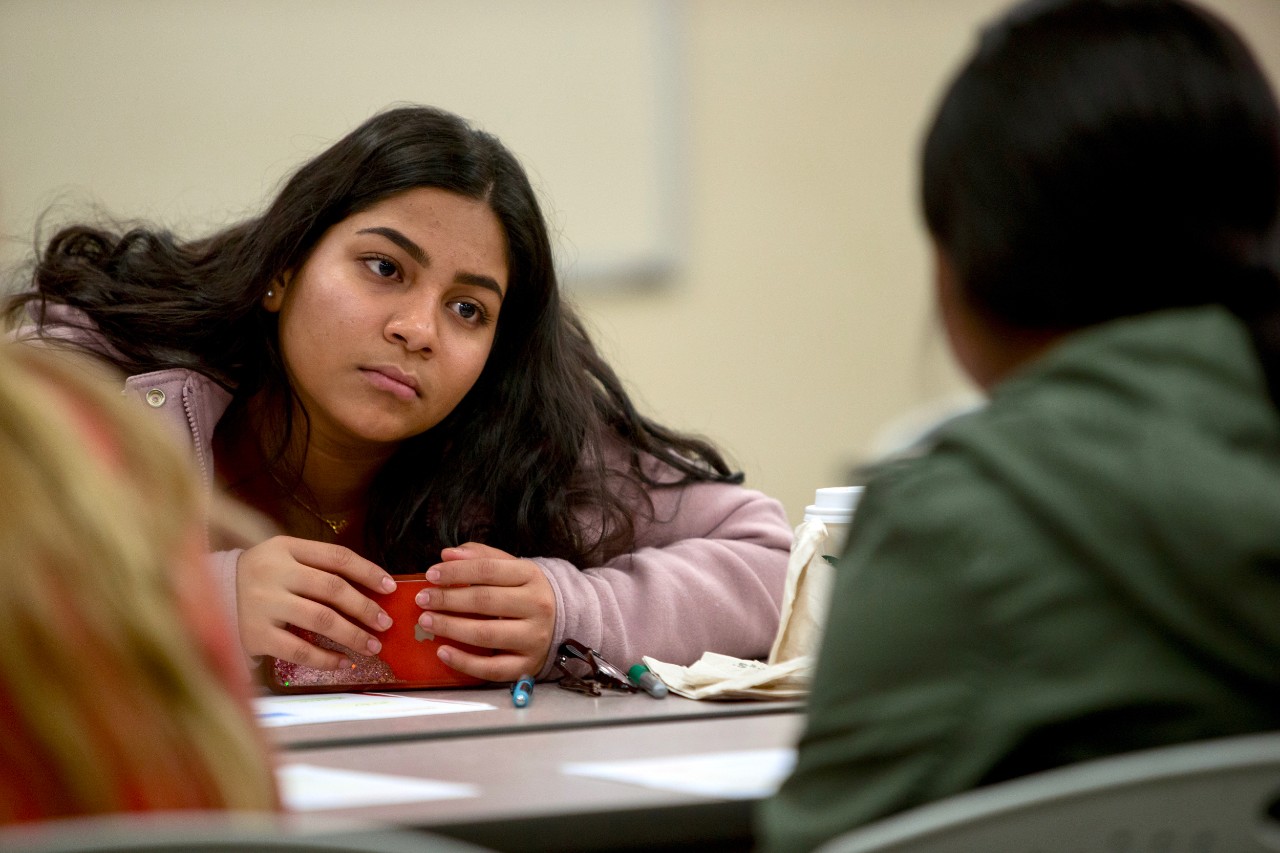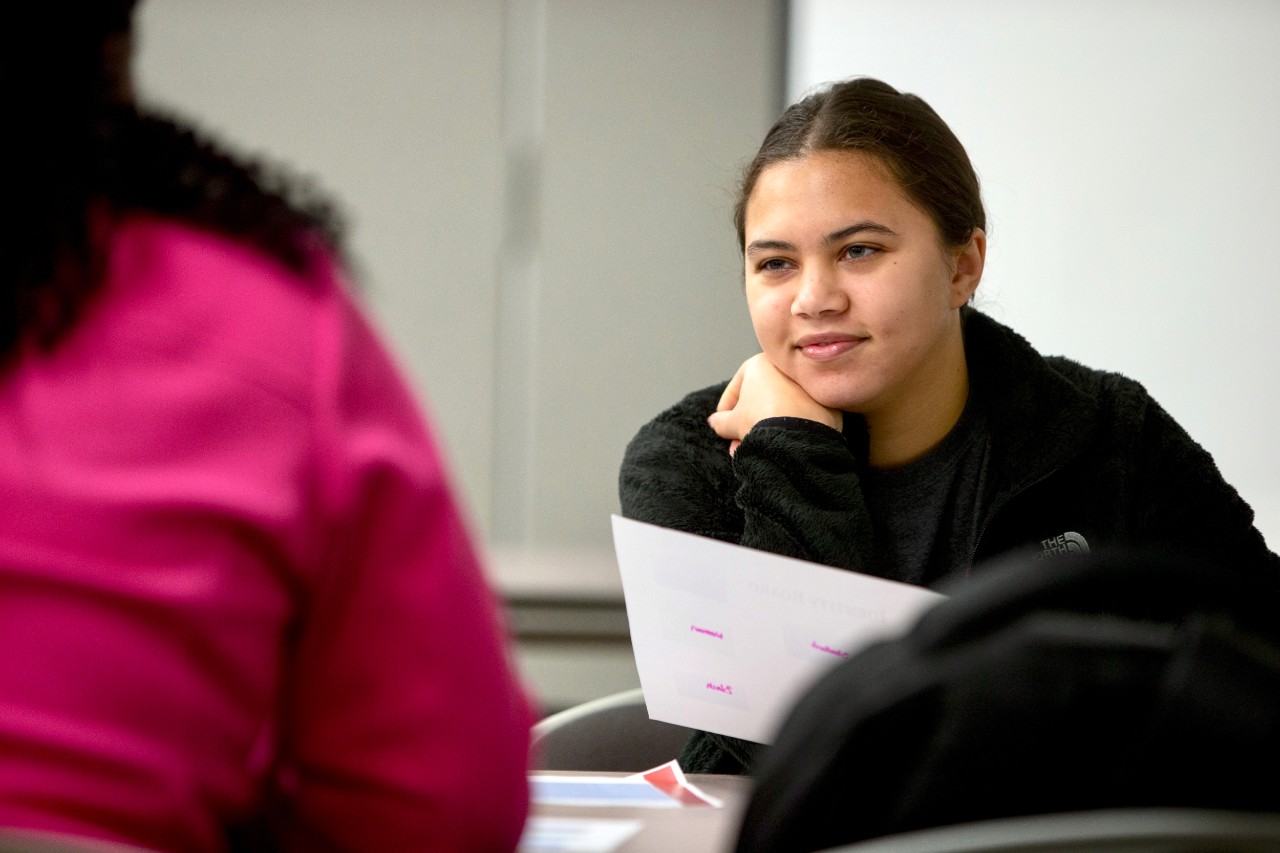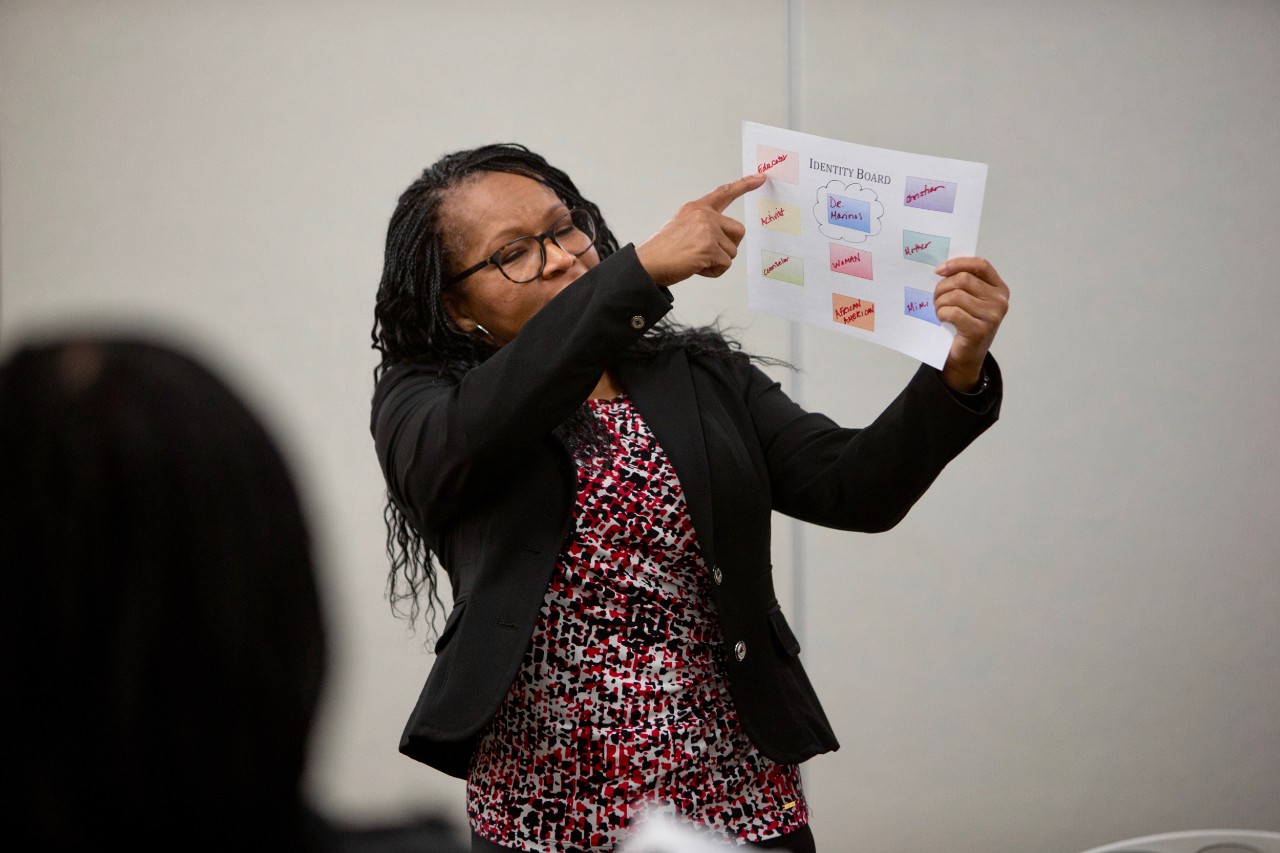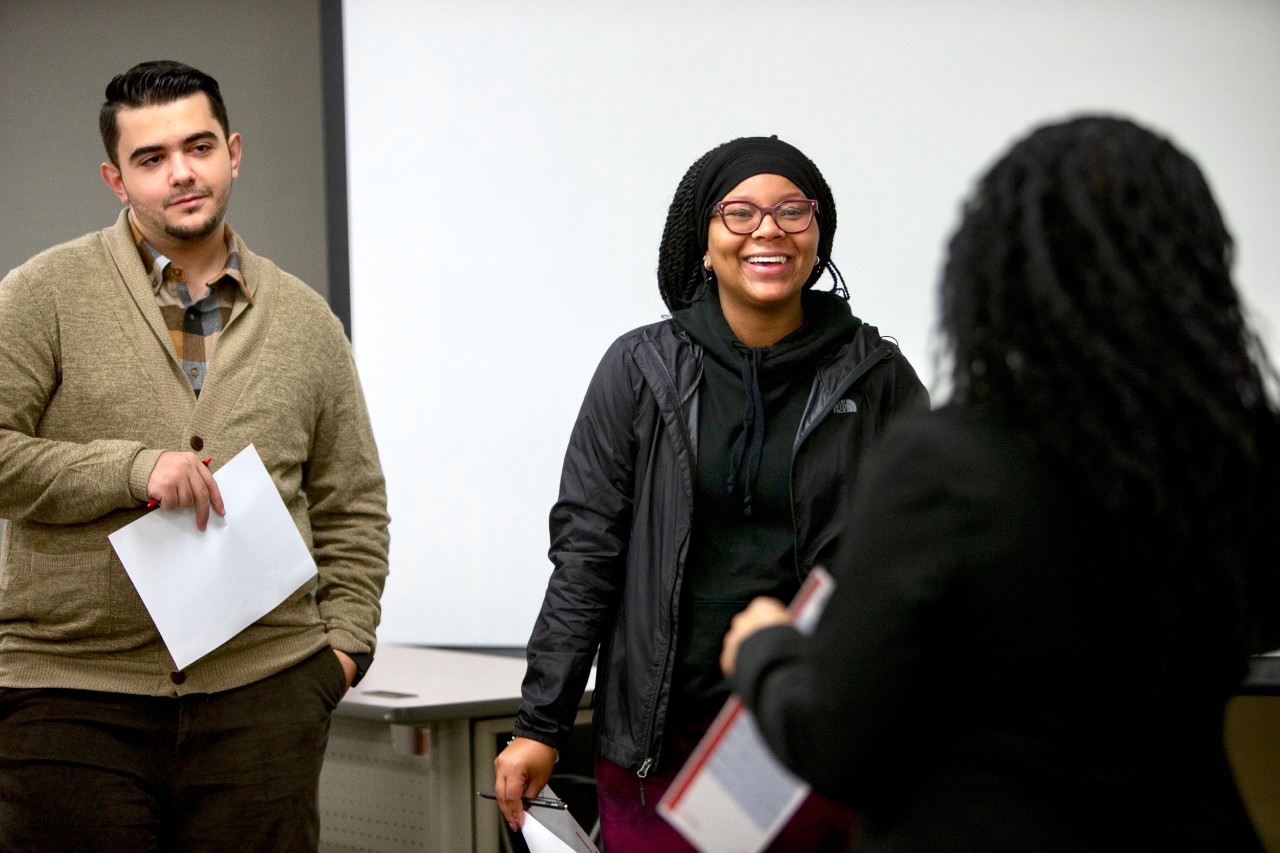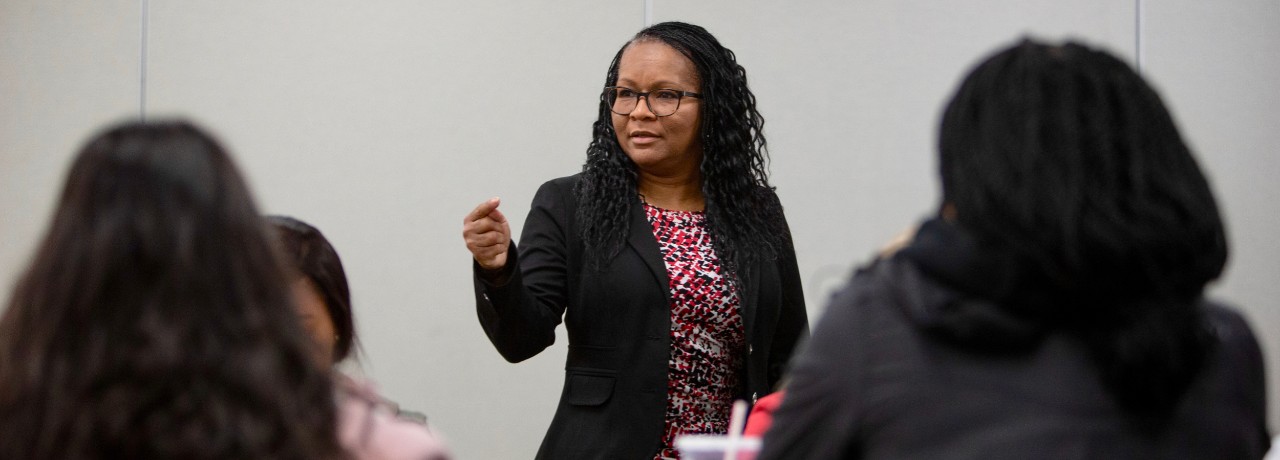
Professors, don't cancel that class!
When faculty are away, UC students build critical thinking skills around inclusion
"Faculty, when you have to be away, don't cancel that class," says Dy'an Marinos, assistant director of the University of Cincinnati's Division of Equity, Inclusion & Community Impact.
"Let us come into your class to open your students up to new ways of thinking that can help bridge a pathway. Skills they will take with them forever."
As part of UC's "Don't Cancel Class!" program, developed by Marinos and Bleuzette Marshall, UC vice president for equity and inclusion, students are now participating in workshops designed to help weave critical thinking skills into their chosen field of study around issues of diversity, equity and inclusion.
Since its inception in 2017, the program has kept students in class building insight and problem-solving skills, while also helping to distinguish UC as a winner of the 2019 Higher Education Excellence in Diversity award from INSIGHT Into Diversity magazine. Inclusive excellence drives UC’s strategic plan, Next Lives Here, bridging each platform and pathway to the others.
UC faculty no longer have to cancel their class when they can't be there," says Marinos. "Instead, one of our equity and inclusion training teams will use that class time to get students involved in fun and engaging exercises that lead to creative self-discovery.
As soon as the conversations start, we see lightbulbs go on."
Transformative learning
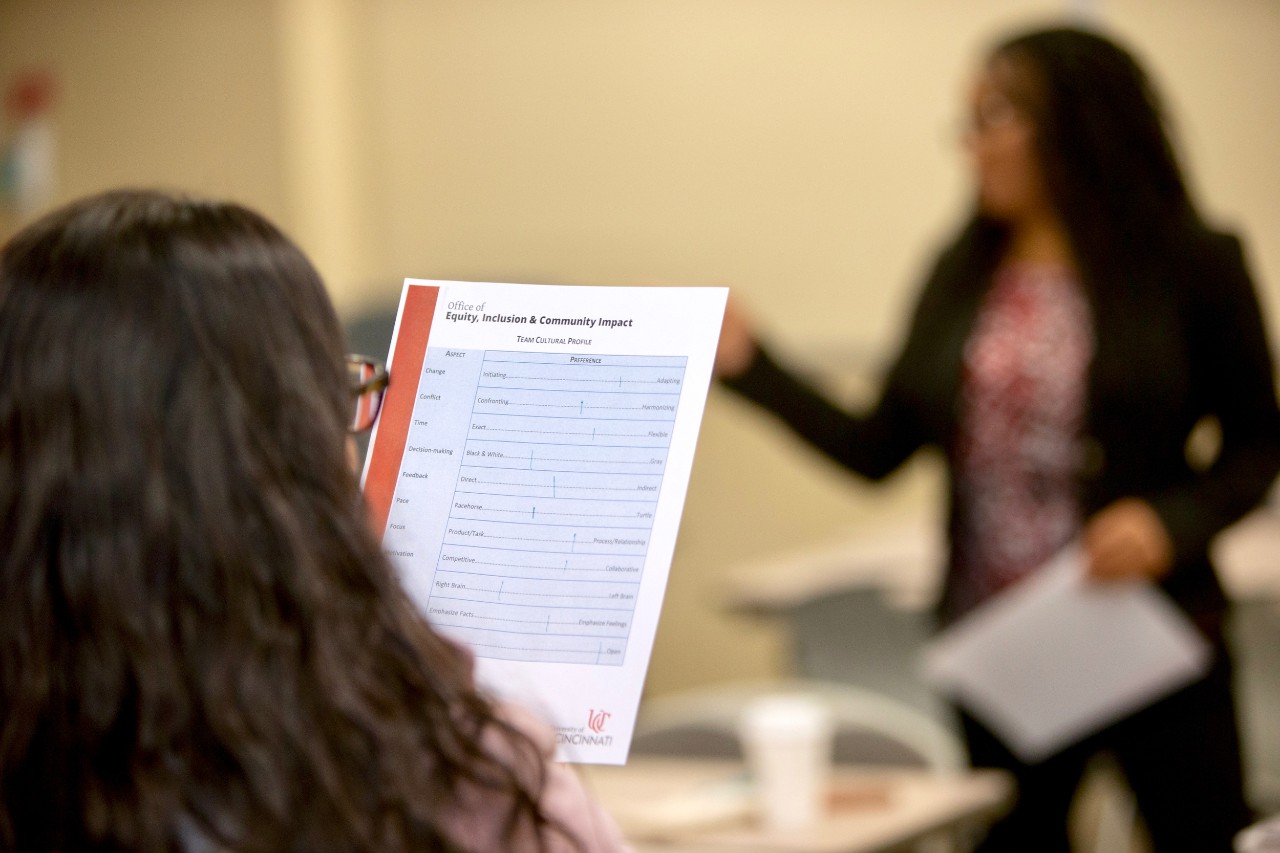
Dy'an Marinos gets conversations rolling during fun exercises in UC's "Don't Cancel Class!" program. photo/Andrew Higley/UC Creative Services
Marinos has led several team-building workshops with UC faculty and staff helping them gain greater insight into developing strong work relationships that break down invisible barriers.
Working with students, Marinos does much the same thing by getting a dialogue started and tapping into issues they are not always aware existed. "We don't stand and lecture on any one topic, but instead, we engage students in activities that get the conversations rolling," she says.
One exercise starts by lining students up in front of the class according to how they view themselves and their preference for change. Those who like to initiate change stand toward one side, and those who mostly adapt to change stand on the other or somewhere in between.
Before long, students place themselves based on a variety of criteria. Whether they considered themselves "racehorses" (quick to finish assignments) or "turtles" (take more time to think things through), Marinos helps them see how a successful team is made of all types of personalities.
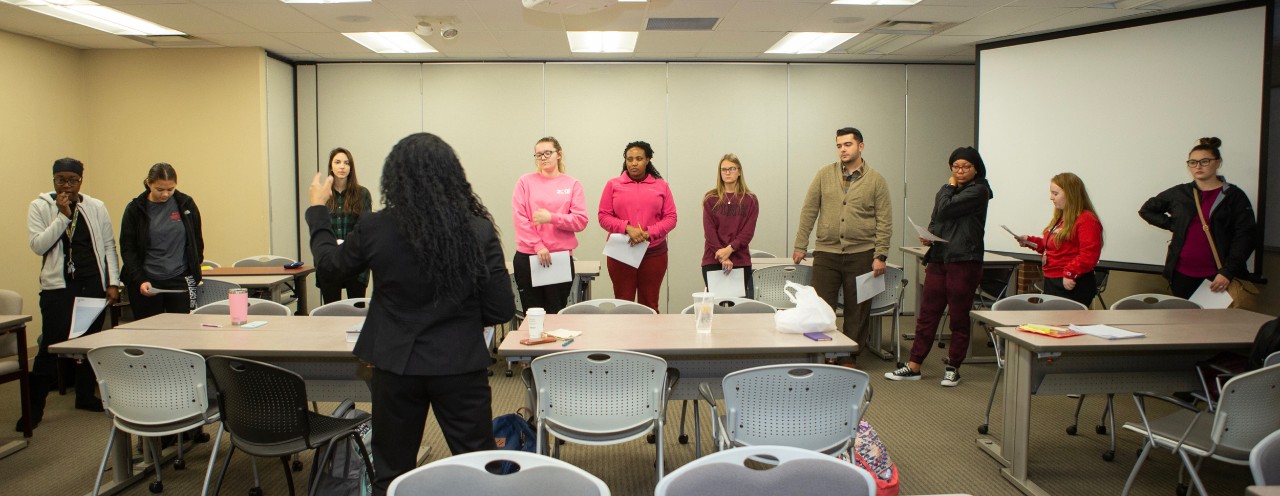
Racehorses or turtles? Students line themselves up on a continuum based on their preference for change in UC's "Don't Cancel Class!" experience. photo/Andrew Higley/UC Creative Services
"So we shouldn't think racehorses are better than turtles because it takes both types to make a good team," says Marinos. "What would be the danger if everyone was a racehorse? They would all work too fast and could make mistakes, while turtles, who take their time typically double-check, investigate deeper and consider other options before finalizing a project."
Another activity allowed students to list personal identifiers they find important such as athlete, musician, poet or creative writer.
"When I ask them to point out a time when they felt proud to be one of their identities, they were excited to volunteer those feelings," she shares. "But when I ask them to identify a time when it was painful to be one of those identities, you could see the difficulty for some in describing those negative feelings."
While the activities vary, Marinos says the goal is the same: provide a space where students feel supported and safe to speak freely as they strive to better understand themselves and others.
"During these exercises, many students open up and talk about identity issues, slowly unlocking critical elements that may be hindering a positive self-image," says Marinos. "So through that conversation, without pushing them or specifically asking about racism, sexism or homophobia or any of those things, we are helping them discover their own experiences with those issues."
"Learning how to understand others within their culture, as is the focus of Dr Marinos’ work and 'Don’t Cancel Class!' program, is invaluable to a future marketer’s education and to us as good global citizens."
Dianne Hardin, executive director UC MS Marketing Program
Diverse discoveries
Marinos doesn't dictate what the issues will be. "I encourage them to create an issue themselves from within their specific discipline and discuss how they would use their identity and values to make an impactful change," she says.
During a business class, for example, she focused on things that the students hold dear regarding work, family and relationships. "We had them think about diversity, equity and inclusion issues in business and how they would use their values or their 'superpowers' to bring change," she says.
As one business student talked about the NFL and a player known for protests, Colin Kaepernick, he focused on how much money that protest and the whole issue was costing major league football.
"His 'superpower' as a great communicator and businessman would ideally work to facilitate communication between Kaepernick and the NFL to try and shore up some of that bleeding of money," she said.
"This is a powerful way to have them think not just about their discipline, but diversity, equity and inclusion in relation to their discipline."
Dianne Hardin, executive director of UC's MS marketing program, and her students found the program insightful on several levels.
"Marketing is all about understanding and engaging with the audience who is purchasing and using your products or services," says Hardin. "This happens within the context of culture — usually a culture that the marketer may not know. Learning how to understand others within their culture, as is the focus of Dr. Marinos’ work and 'Don’t Cancel Class!' program, is invaluable to a future marketer’s education and to us as good global citizens."
Inclusive impact
UC faculty can take advantage of this workshop when they know they have to be away from the classroom for a conference or presentation. "Or they can schedule us to come in while they are there simply to bring new perspectives and skill-building exercises to their class," says Marinos. "We also have materials we are happy to provide such as the sheets for the identity boards or games that people can borrow in their own sessions," she adds.
As a great conversation starter, Marinos has had success by throwing a Thumball, a small ball with topics or questions printed all over. The ball is tossed, and the person answers the question printed on the block where their thumb lands. For example, "Favorite foods to cook?" or "Who do I ask for advice?"
The program's trainers, which include Marinos, Marshall and Matt Olovson, executive director of UC Equal Opportunity and Access, were in 38 classrooms in 2019 and are looking to expand on that this year.
"Once people see how these games work they can use them within their units at staff meetings or classrooms," says Marinos. "We just want to start the conversation, we don't have to own the conversation. Our goal is to help get people engaged in this discourse using us or our resources. So we're happy to help and provide what we can."
The bottom line in much of her work with students is to develop empathy and demonstrate the impact of language. "Even the most intelligent student can still struggle with effective communication," says Marinos. "Enhancing communication skills that allow individuals to engage comfortably can make the good student an even better professional as they learn to work effectively across differences."
To schedule a workshop, visit "Don't Cancel Class!"
Featured image at top: Dy'an Marinos engages students in workshops on diversity, equity and inclusion as part of the "Don't Cancel Class!" program. Photo/Andrew Higley/UC Creative Services
Become a diverse and inclusive Bearcat
- Apply online or get more information about undergraduate enrollment by calling 513-556-1100.
- Learn more about UC's many undergraduate and graduate programs.
Next Lives Here
Next Lives Here, the University of Cincinnati’s strategic direction, defines our moment and our momentum. More nimble and more robust than a plan, Next Lives Here announces our vision to the world—to lead urban public universities into a new era of innovation, impact, and inclusion.
Tags
- College-Conservatory of Music
- College of Pharmacy
- Equity and Inclusion
- College of Medicine
- Student Experience
- College of Arts and Sciences
- College of Allied Health Sciences
- College of Education, Criminal Justice, & Human Services
- Blue Ash College
- Clermont College
- College of Design, Architecture, Art, and Planning
- Graduate School
- College of Law
- Diversity
- College of Nursing
- Lindner College of Business
- Next Lives Here
- College of Engineering and Applied Science
Related Stories
9 Things OB/GYNs want women to know about early menopause
January 6, 2025
Menopause doesn't typically happen until women reach their late 40s or 50s, but some experience early onset menopause. So, Well+Good put together nine things experts want women to know about why early menopause happens, if the treatment options are any different from regular menopause, and how it affects overall health. Michael Thomas, MD, department chair and OB/GYN at the University of Cincinnati College of Medicine, offered his expertise for the article.
UC experts share holiday survival tips in local news report
January 6, 2025
One poor choice could lead to lasting health effects. That's why experts at the University of Cincinnati College of Medicine offered advice to keep everyone safe and avoid an emergency during the holiday season. From food poisoning to children swallowing a button battery, there are a lot of things that can go wrong.
Why is anxiety worse at night?
January 6, 2025
The University of Cincinnati's Jeffrey Strawn was featured in a TIME article discussing why anxiety can be worse at night and tips to address nighttime anxiety.

